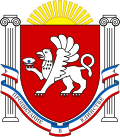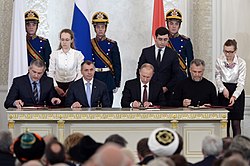| Head of the Republic of Crimea | |
|---|---|
| |
 | |
| Executive branch of the Republic of Crimea | |
| Style | |
| Type | |
| Residence | Simferopol |
| Nominator | President of the Russian Federation |
| Appointer | State Council |
| Term length | Five years, no more than two consecutive terms |
| Precursor | President of Crimea |
| Formation | 9 October 2014 |
| First holder | Sergey Aksyonov |
| Website | Official website |
| This article is part of a series on the politics and government of |
| Crimea |
|---|
 |
| Autonomous Republic of Crimea (within Ukraine, 1991–present) |
|
| Republic of Crimea (territory occupied by Russia 2014–present) |
| See also |
| Political status of Crimea Politics of Russia • Politics of Ukraine |
The Head of the Republic of Crimea is the highest official and the head of the executive power of the Republic of Crimea, an internationally disputed federal subject of the Russian Federation located on the Crimean Peninsula. [1]
Contents
- History
- Background
- Ukrainian President of Crimea
- From Ukraine to the Russian Federation
- Eligibility and authorities
- Presidential appointed officials
- List
- Elections
- 2014
- 2019
- Notes
- References
- External links
Crimean Head's policy is to ensure compliance with the Constitution and federal laws and the Constitution and laws of the Republic of Crimea, as well as the equality of nations and the rights and freedoms of man and citizen, and the preservation of the coordinated functioning of state bodies of the Republic. Person under 30 cannot be a head of the Republic.
Term of office is five years. Appointed by the State Council of the Republic on nomination of President of the Russian Federation. Interim Head of the Republic is appointed directly by President.
The current Head of the Republic Sergey Aksyonov was elected in 2014 and re-elected in 2019.






